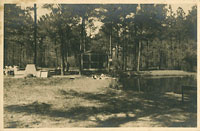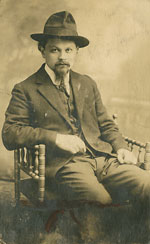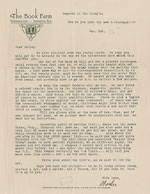The Book Farm
When book dealer Charles Heartman dreamed up an idea for a colony of writers, artists, and intellectuals to live together in pastoral leisure, he left the bustle of more bookish urban centers and relocated to the Piney Woods of the deep South where he published bibliographies, auction catalogues, and historical reprints under the curious name, The Book Farm, in the little known town of Hattiesburg, Mississippi.
A German émigré, Heartman (1883-1953) began collecting books at an early age, and, as an adult, became a renowned book dealer, editor, and publisher. He owned bookstores in New York and Vermont and later moved to Metuchen, New Jersey, where he hosted notable book auctions at his home. Heartman edited the magazines The American Collector and The American Book Collector, published well-regarded and carefully detailed bibliographies and reprints as part of his Heartman Historical Series, and produced catalogues for his auctions and mail-order business. He developed an interest in African Americana and built an important collection of documents, pamphlets, and other materials, parts of which are now preserved in academic libraries at Xavier University and Texas Southern University. While shops, auctions, bibliographies, and editorial work were natural business endeavors and logical intellectual pursuits of the book-minded collector, Heartman was restless. He sought not only warmer climes for his health, but had grander visions of a surprising new way of life.
In 1935, Heartman moved to New Orleans with his wife, Martha, and daughter Dolley Madison (known as Madison). It was during this time that Heartman decided to act on an idea that had been on his mind for many years. He hoped to establish a Utopian colony comprised of writers, artists, and intellectuals. This group of thinkers and creative sorts would build their own homes, grow food, wander, type, and paint. A bookman’s utopia. His was not a venture based on radical socialist ideals or gestures toward the communal spirit evident in other Utopian efforts (such as the similarly named Brook Farm that George Ripley had founded nearly one hundred years earlier). He probably would not even have considered himself part of the mid-century “back to the land” movement. But Charles Heartman was a complicated man. Known for expressing his opinions sharply in his magazines and elsewhere—“difficult” is the diplomatic adjective assigned to his sometimes railing, harsh, cruel personality—one does not immediately associate this rather tyrannical husband and father with slow walks near streams or pensive moments in an orchard of pecan trees. His motivations were based largely on economic realities and an attempt to escape the “worry of the complexities of present day political and economic life and the viciousness of having to give a greater part of the result of one’s labour either in direct or indirect taxes or to a non-productive middleman.” Perhaps he was a little radical.
Heartman’s first move was to invite participation in the colony through an advertisement in The Saturday Review of Literature. Curious readers responded with questions about the particulars and with details about their own lives and their potential contributions to such an enterprise. A young student at Yale University studying theater and chemistry thought he might be a good fit; two teachers aged 32 and 40 mentioned that they could type and drive and, though they knew how to teach, would rather not. An eagle scout from Tennessee with an interest in “people, social organizations and economics” thought his swimming and first aid skills might be useful to the group. A chiropractor from the Bronx with “an interest in natural living” wrote several times.













